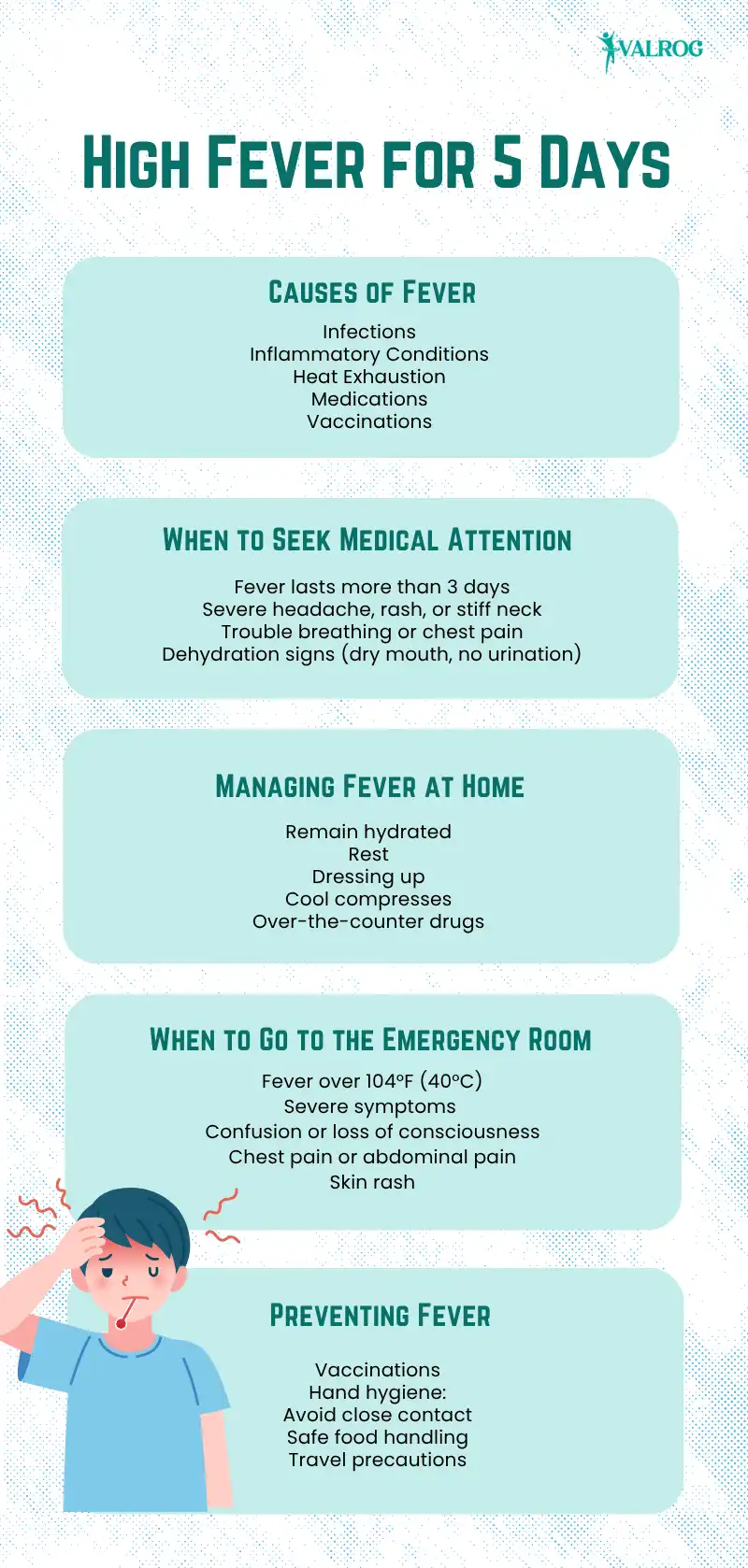Are you experiencing high fever for 5 days? And afraid that it was too long? It is unlikely that you should make some concerns because fever is regularly a sign of a different disorder.

One of the most well-known symptoms is fever that normally shows that your body is combating an infection. It is more or less uncomfortable but not something that should be alarmed about. Nevertheless, the knowledge about the fever character, its possible causes, and the period of seeking medication is of great importance to your health and well-being.
What Is a Fever?
Fever is a condition that is usually characterized by a body temperature of more than 100.4 degrees Fahrenheit (38 degrees Celsius). It is a reaction of the immune system to other things mostly infection. When tremedous amounts of pyrogens which are substances that cause fever are exposed to the body, the body rises to the set point temperature of the hypothalamus causing a rise in temperature.
Normal Body Temperature
The normal body temperature depends on a person and hours. Usually, it varies between 97 o F (36.1 o C) to 99 o F (37.2 o C). Such variables as age, level of activity, and method of measurement might affect these values.
Causes of Fever
Fever can result from a variety of conditions, including:
- Infections: The most frequent ones are bacterial, viral, or fungal. These include the flu, pneumonia, urinary tract infections (UTIs) and COVID-19.
- Inflammatory Conditions: This could be caused by conditions such as rheumatoid arthritis or lupus where a long-term fever results.
- Heat Exhaustion: Developing a fever as a result of overheating because of the exposure to large temperatures a long period of time.
- Medications: There are drugs that cause a side effect called a drug fever like antibiotics or antihistamines.
- Vaccinations: Immunizations may result in a mild fever that comes with the body combating the body.
When to Seek Medical Attention
The majority of fevers can disappear without any professional help, but some cases should be addressed to a doctor:

Duration of Fever
- Persistent fever (More than 3 days): When fever does not resolve after the third day, it is better to see a medical professional to exclude the presence of pathologies.
- Five days of high fever: It is suggested that a fever above 102 o F (38.9°C) that lasts several days should be treated by a physician.
Accompanying Symptoms
Seek immediate medical attention if you experience:
- Severe headache or stiff neck
- Difficulty breathing or chest pain
- Persistent vomiting or diarrhea
- Confusion, drowsiness, or seizures
- Skin rash that doesn’t fade under pressure
- Painful urination or dark-colored urine
- Recent travel to areas with endemic diseases
Special Populations
- Infants and young children: For infants under 3 months, any fever is considered an emergency. For older children, consult a doctor if the fever is high or persistent.
- Elderly individuals: Older adults may not exhibit typical fever symptoms but can still experience serious infections. Seek medical advice if there’s a persistent low-grade fever or other concerning symptoms.
- Individuals with chronic conditions: Those with heart disease, diabetes, or compromised immune systems should seek medical attention sooner, as they are at higher risk for complications.
Managing Fever at Home
Medication Home treatment may be successful in cases of mild fevers without disturbing symptoms:
- Remain hydrated: Ensure that you drink a lot of fluids such as water, herbal tea or broth to avoid dehydration.
- Rest: Take good rest to assist your body to combat the infection.
- Dressing up: It is important to wear light clothes and light beddings to prevent overheating.
- Cool compresses: To feel a cool cloth over the forehead, a damp one can be used.
- Over-the-counter drugs: Acetaminophen (Tylenol) or ibuprofen (Advil, Motrin) drugs will help treat fever and bring relief. Use medication and dose as recommended and ask a medical professional when in doubt.
Note: Do not use aspirin with children or teenagers because of such condition as Reye syndrome that might appear as a result of aspirin.
When to Go to the Emergency Room
Immediate medical attention is necessary if:
- Fever exceeds 104°F (40°C)
- Severe symptoms such as seizures, persistent vomiting, or difficulty breathing occur
- Confusion or loss of consciousness is experienced
- Chest pain or abdominal pain is present
- Skin rash that doesn’t blanch under pressure appears
In these cases, go to the nearest emergency department or call emergency services.
Understanding Persistent or Recurrent Fevers
A prolonged (high fever for 5 days) fever that is not always constant, may show:
- Chronic infections: Conditions such as tuberculosis or endocarditis.
- Autoimmune diseases: A disease like lupus or Still disease.
- Cancers: Some malignancies such as lymphoma or leukemia may show up with long-lasting fevers.
- Drugs: Certain medication may lead to drug induced fevers.

In such cases, a healthcare provider may conduct tests like blood cultures, imaging studies, or biopsies to determine the underlying cause.
Preventing Fever
While it’s not always possible to prevent a fever, certain measures can reduce the risk:
- Vaccinations: Stay up-to-date with recommended vaccines to protect against preventable diseases.
- Hand hygiene: Regular handwashing can prevent the spread of infections.
- Avoid close contact: Steer clear of individuals showing symptoms of contagious illnesses.
- Safe food handling: Properly cook and store food to prevent foodborne illnesses.
- Travel precautions: When traveling, especially internationally, take necessary precautions and vaccinations to protect against endemic diseases.
High fever for 5 days; result of an underlying issue
Fever is a common symptom that often indicates the body is fighting an infection. While most fevers are not serious and resolve with home care, it’s essential to monitor the duration and accompanying symptoms. If you have high fever for 5 days and it still wont go away, is unusually high, or is accompanied by severe symptoms, seek medical attention promptly. Early intervention can help identify and treat underlying conditions, ensuring better health outcomes.
Remember, when in doubt, it’s always safer to consult a healthcare professional to determine the appropriate course of action.
